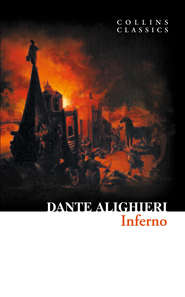скачать книгу бесплатно
“O thou that art conducted through this Hell,”
He said to me, “recall me, if thou canst;
Thyself wast made before I was unmade.”
And I to him: “The anguish which thou hast
Perhaps doth draw thee out of my remembrance,
So that it seems not I have ever seen thee.
But tell me who thou art, that in so doleful
A place art put, and in such punishment,
If some are greater, none is so displeasing.”
And he to me: “Thy city, which is full
Of envy so that now the sack runs over,
Held me within it in the life serene.
You citizens were wont to call me Ciacco;
For the pernicious sin of gluttony
I, as thou seest, am battered by this rain.
And I, sad soul, am not the only one,
For all these suffer the like penalty
For the like sin;” and word no more spake he.
I answered him: “Ciacco, thy wretchedness
Weighs on me so that it to weep invites me;
But tell me, if thou knowest, to what shall come
The citizens of the divided city;
If any there be just; and the occasion
Tell me why so much discord has assailed it.”
And he to me: “They, after long contention,
Will come to bloodshed; and the rustic party
Will drive the other out with much offence.
Then afterwards behoves it this one fall
Within three suns, and rise again the other
By force of him who now is on the coast.
High will it hold its forehead a long while,
Keeping the other under heavy burdens,
Howe’er it weeps thereat and is indignant.
The just are two, and are not understood there;
Envy and Arrogance and Avarice
Are the three sparks that have all hearts enkindled.”
Here ended he his tearful utterance;
And I to him: “I wish thee still to teach me,
And make a gift to me of further speech.
Farinata and Tegghiaio, once so worthy,
Jacopo Rusticucci, Arrigo, and Mosca,
And others who on good deeds set their thoughts,
Say where they are, and cause that I may know them;
For great desire constraineth me to learn
If Heaven doth sweeten them, or Hell envenom.”
And he: “They are among the blacker souls;
A different sin downweighs them to the bottom;
If thou so far descendest, thou canst see them.
But when thou art again in the sweet world,
I pray thee to the mind of others bring me;
No more I tell thee and no more I answer.”
Then his straightforward eyes he turned askance,
Eyed me a little, and then bowed his head;
He fell therewith prone like the other blind.
And the Guide said to me: “He wakes no more
This side the sound of the angelic trumpet;
When shall approach the hostile Potentate,
Each one shall find again his dismal tomb,
Shall reassume his flesh and his own figure,
Shall hear what through eternity re-echoes.”
So we passed onward o’er the filthy mixture
Of shadows and of rain with footsteps slow,
Touching a little on the future life.
Wherefore I said: “Master, these torments here,
Will they increase after the mighty sentence,
Or lesser be, or will they be as burning?”
And he to me: “Return unto thy science,
Which wills, that as the thing more perfect is,
The more it feels of pleasure and of pain.
Albeit that this people maledict
To true perfection never can attain,
Hereafter more than now they look to be.”
Round in a circle by that road we went,
Speaking much more, which I do not repeat;
We came unto the point where the descent is;
There we found Plutus the great enemy.
CANTO VII (#ulink_e302aaf5-a424-550e-9743-b24c3c3b9557)
“Pape Satan, Pape Satan, Aleppe!”
Thus Plutus with his clucking voice began;
And that benignant Sage, who all things knew,
Said, to encourage me: “Let not thy fear
Harm thee; for any power that he may have
Shall not prevent thy going down this crag.”
Then he turned round unto that bloated lip,
And said: “Be silent, thou accursed wolf;
Consume within thyself with thine own rage.
Not causeless is this journey to the abyss;
Thus is it willed on high, where Michael wrought
Vengeance upon the proud adultery.”
Even as the sails inflated by the wind
Involved together fall when snaps the mast,
So fell the cruel monster to the earth.
Thus we descended into the fourth chasm,
Gaining still farther on the dolesome shore
Which all the woe of the universe in sacks.
Justice of God, ah! who heaps up so many
New toils and sufferings as I beheld?
And why doth our transgression waste us so?
As doth the billow there upon Charybdis,
That breaks itself on that which it encounters,
